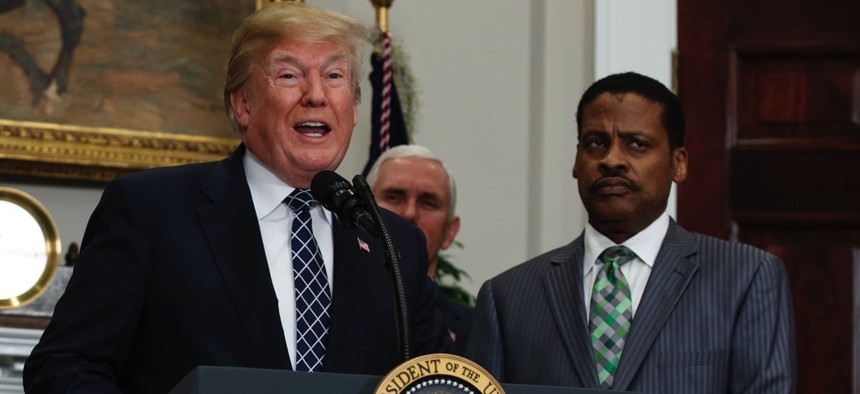Civil Rights Activists Won’t Let Trump’s ‘Racist’ Rhetoric Derail an Immigration Agreement

President Trump speaks during an event honoring Martin Luther King Jr. while his nephew, Isaac Newton Farris Jr., listens on Friday at the White House. Evan Vucci / AP Photo

Connecting state and local government leaders
The president denied on Twitter Friday that he had called Haiti, El Salvador and African nations “shithole countries,” after attacking a bipartisan deal offering ex-DACA recipients a pathway to citizenship.
Civil rights leaders on Friday condemned President Trump’s characterization of Haitian, Salvadoran and African immigrants as “people from shithole countries”—racist rhetoric he later denied using—while stressing a bipartisan deal protecting Dreamers was close at hand.
Trump proposed accepting more Norwegian and Asian immigrants while barring Haitians altogether during an Oval Office meeting with a bipartisan group of lawmakers to discuss immigration protections, according to several people briefed on the discussions, The Washington Post reported.
The president created a crisis for about 690,000 undocumented immigrants brought to the U.S. as children, when he announced plans in September to phase out Deferred Action for Childhood Arrivals; 60,000 Haitians, when their 2010 earthquake temporary protected status was rescinded in November; and 200,000 Salvadorans, when their 2001 earthquakes TPS was ended earlier this month. Those threatened with detainment, arrest and deportation are overwhelmingly people of color.
“Trump wants to implement a racial purge,” said Judith Brown Dianis, The Advancement Project’s executive director, on a Friday conference call. “He wants a whitening of America.”
An agreement providing a pathway to citizenship for former DACA recipients, or Dreamers, increasing border security and changing the immigration system was tentatively reached Thursday by six U.S. senators: Republicans Lindsey Graham of South Carolina, Cory Gardner of Colorado, and Jeff Flake of Arizona along with Democrats Richard Durbin of Illinois, Michael Bennet of Colorado and Robert Menendez of New Jersey.
After White House officials didn’t refute The Post’s report, Trump took to Twitter to rebut that he made bigoted remarks and attack the details of the deal, which he has vacillated on signing should it hit his desk:
“Norway is not a skill,” said Clarissa Martínez-de-Castro, UnidosUS’s deputy vice president, in response to Trump’s claim he wants a merit-based system.
While draft legislation hasn’t yet been circulated, the six senators were in agreement on cutting the visa lottery program by 50 percent and then prioritizing those countries already in the system. But Trump wants to “gut the legal immigration system,” Martínez-de-Castro said.
Senate Majority Leader Mitch McConnell, a Republican from Kentucky, has said he’ll only bring forward an immigration bill with Trump’s support. But the federal government runs out of money on Jan. 19. And Democrats have said they’ll refuse to support a stopgap spending measure unless a DACA agreement is reached, though that would not mean it has to be passed by then.
“What this does do is it eliminates Congress’ ability to plead ignorance,” said Jonathan Jayes-Green, UndocuBlack Network’s co-founder and director. “Either side with this racist agenda or protect immigrant communities now.”
The 200 organizations that comprise The Leadership Conference on Civil and Human Rights are short on time. According to President and CEO Vanita Gupta, 122 Dreamers lose DACA status and work authorization every day while Trump uses them “as high-stakes bargaining chips.”
DACA expires March 5, though Trump has told at least one Republican senator that deadline is flexible. TPS ends July 22, 2019 for Haitians and Sept. 9, 2019 for Salvadorans.
Civil rights activists were clear, Trump’s disparaging comments were a distraction from the work of convincing Congress to intervene.
“His tweets and his words have mattered a lot to establish racist intent,” Gupta said. “I am confident civil rights litigators will be mining his comments to show the intent of his policies in court.”
A Post-ABC News poll found 86 percent of Americans support Dreamers staying in the country, a statistic that could hurt Republicans in the 2018 midterm elections—assuming an agreement isn’t reached.
“This isn’t about elections. This is not partisan. This is not political,” Gupta said. “This is a moral reckoning for our country.”
Dave Nyczepir is a News Editor at Government Executive’s Route Fifty and is based in Washington, D.C.
NEXT STORY: Kentucky’s Medicaid Waiver Will Do More Than Just Require People to Work





